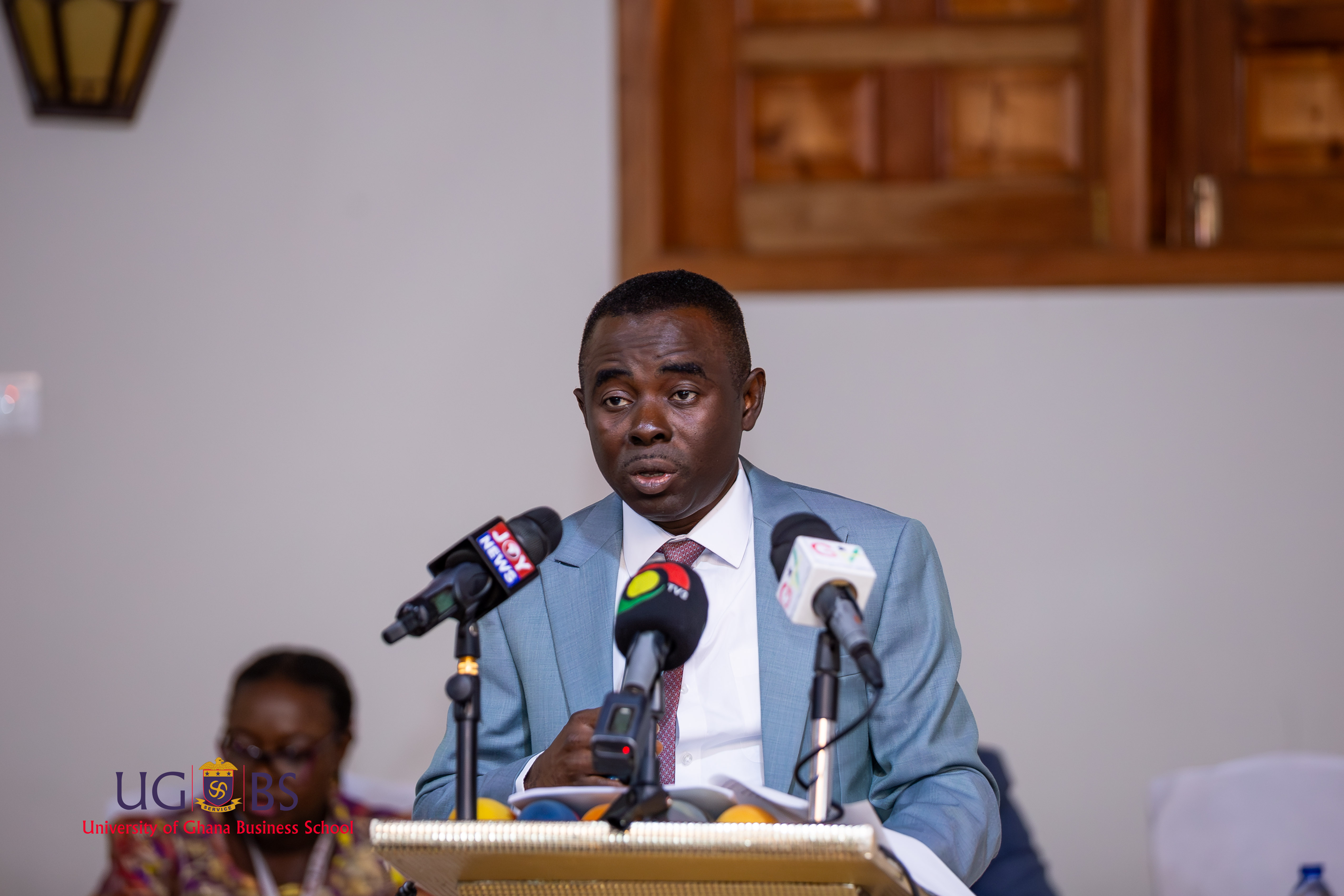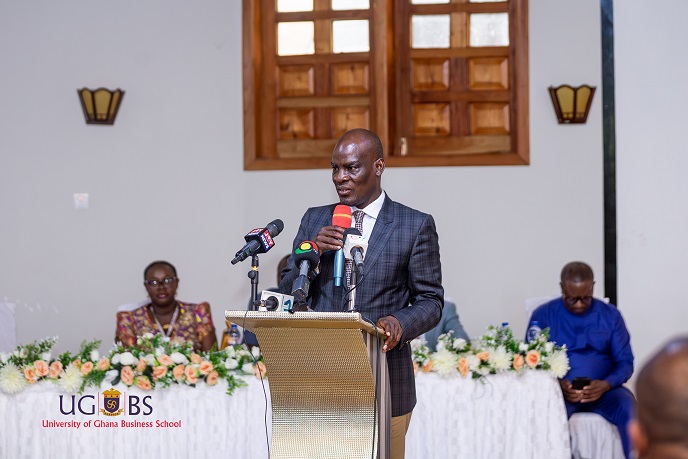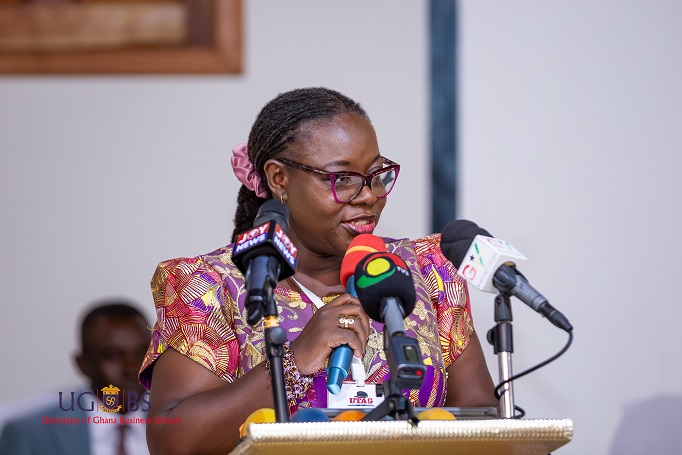
Prof. Joshua Yindenaba Abor Speaks at UTAG’s 22nd Biennial National Delegates Congress
Prof. Joshua Yindenaba Abor, a professor of finance at the University of Ghana Business School (UGBS), served as a Guest Speaker at the 22nd Biennial National Delegates Congress of the University Teachers Association of Ghana (UTAG), held on 30th September 2025 at the Hill Palace Hotel, Aburi. Prof. Abor spoke on the theme, “Sustainable University Funding: Innovating Resilient and Future-Focused Financial Models for Tertiary Education in Ghana.” The Congress was held under the broader theme “Rethinking Higher Education Pedagogy and Funding in the Age of AI: Ethics, Equity, and Development Impact,” and it brought together academics, policymakers, and education leaders to deliberate on the future of higher education in Ghana.
Prof. Abor emphasised the importance of sustainable funding for Ghana’s higher education sector, describing it as the engine that drives innovation, nurtures leadership, and fosters socio-economic change. He explained that Ghana’s tertiary education system, which educates over 700,000 students across 25 public universities and approximately 81 accredited private institutions, continues to suffer from chronic underfunding. He clarified that traditional funding sources, such as government grants, tuition fees, and donor contributions, are no longer sufficient due to increasing enrolments, infrastructure needs, and the pursuit of research excellence. He also highlighted the role of the Ghana Education Trust Fund (GETFund) in infrastructure development but noted its challenges, including arrears, politicisation, and concerns over sustainability. He noted that private universities depend heavily on tuition fees and endowments, which restrict their scale, affordability, and research capacity.
According to Prof. Abor, the main challenges facing Ghana’s tertiary education financing include inadequate and unpredictable government subventions, limited revenue diversification, rising enrolments alongside infrastructure gaps, weaknesses in student financing, and the lack of strong institutional fundraising structures. He also pointed out the issue of human capital retention, emphasising that the migration of skilled academics abroad continues to weaken teaching and research capacity. Prof. Abor stressed that sustainable university funding is both a financial and developmental necessity. Prof. Abor outlined a multi-faceted strategy for resilience and long-term sustainability. His proposals included performance-based funding linked to student outcomes and research productivity, fee reforms such as a two-track system and improved student loan schemes, public-private partnerships (PPPs) to address infrastructure gaps, enhanced autonomy and efficiency through flexible funding models, expanded donor and industry partnerships along with stronger alumni contributions, research commercialisation and innovation hubs to generate royalties and support start-ups, green and sustainable practices such as retrofitting university buildings with sustainable energy to reduce costs and align with global sustainability goals, and scaling up the Ghana National Research Fund (GNRF), launched in 2025, to promote locally relevant research. He further encouraged universities to leverage international collaborations, diaspora networks, and digital platforms to strengthen institutional competitiveness.

Delivering the keynote address at the Congress, the Minister of Education, Hon. Haruna Iddrisu, announced that government had initiated steps to address staffing shortages in the education sector. He disclosed that a joint Cabinet memo had been signed for the recruitment of 93,000 personnel across institutions of higher learning, the Commission for Tertiary Education, the Ghana Education Service, and the Technical and Vocational Education and Training (TVET) Service. He explained that even if only 56,000 recruits were secured, at least 10,000 would be allocated to tertiary education to help replace faculty and staff who had exited the system.
The Minister also acknowledged UTAG’s threat of industrial action over book and research allowances, noting that everything will be addressed soon. He emphasised the need to integrate Artificial Intelligence (AI) into teaching and learning. He announced that Ghana would host a continental conference on The Future of Education in the Age of AI in the first quarter of 2026. In addition, he revealed that government was developing a National AI Education Framework and revising curricula to introduce AI, coding, robotics, and electronics at the basic education level. Furthermore, Hon. Iddrisu disclosed that he had requested GHS 300 million from the Ministry of Finance to expand facilities in Category A schools, particularly dormitories and classrooms, to enable the institutions to double their intake.

In her remarks, the Vice-Chancellor of the University of Ghana, Prof. Nana Aba Appiah Amfo, lauded the Congress as an important platform for reflection on contemporary issues affecting higher education. She stressed the need for universities to reorganise, retool, and leverage AI responsibly to ensure academic integrity, critical thinking, and problem-solving. Prof. Amfo further urged stakeholders to embrace collaborative approaches rather than working in silos. She noted that Ghana’s constrained public finances, rapid enrolment growth, and global labour market shifts demand coordinated and innovative responses. She emphasised that designing pedagogy and financing models that are ethical, equitable, and development-oriented was now a national imperative.